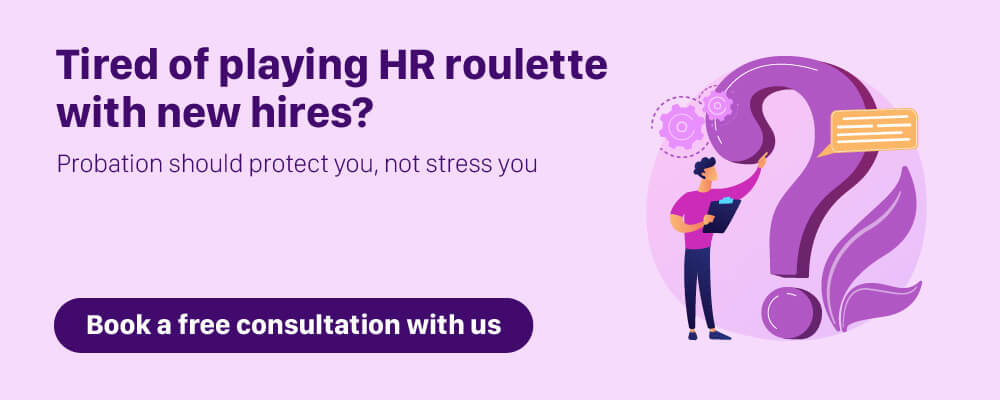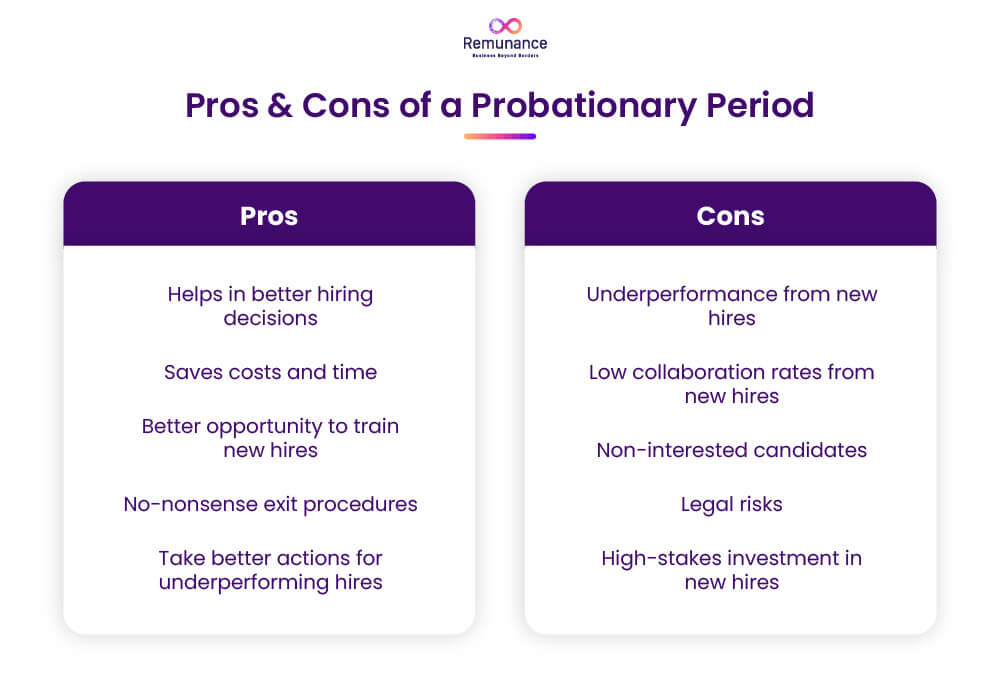Summary
Probationary period is crucial for both employers and employees. Employers can assess the candidates in the allotted time period. Employees get enough time to adjust to company culture. When partnered with an EOR, employees don’t have to worry about legal aspects of probationary period across countries.
Probationary period is a relatively common term known to both employers and employees. In the modern day, it’s designed to assess global talent in a more measured way. But it didn’t start this way. The concept began during industrial times. Times when employers needed a trial run before offering permanent roles. Today, the probationary employment period is a calculated checkpoint. It’s built into contracts to reduce hiring risk.
In this blog, we’ll cover:
-
- What is a probationary period and how does it work
- How countries like the US, Germany, India, and France define it legally
- Benefits and downsides for both employers and employees
- How probation works with Employer of Record (EOR) models
- What happens after the period ends
We’ll also look at real-life incidents and practical tips to manage probation the right way. Whether you’re expanding globally or hiring locally, this phase can always help. So, let’s get started. Shall we?
What is a Probationary Period?
Probationary period is like a built-in trial run, a short-term pilot phase before making things official with a new hire.
Usually lasting for 3 to 6 months, this period gives you time to see if the person is genuinely the right fit for the role and your company culture.
It’s basically a “try-before-you-buy” setup. You’re observing how they perform, show up, learn, take feedback, and blend into the team.
It’s about learning whether the candidate can adapt to your business environment or not.
Now, what should be your contribution to this? Simple. During the probationary employment period, expectations and standards should be clearly laid out. Let your new hire know what “good” looks like from day one.
You can also provide support, training, and regular check-ins to smooth out the process for them.
The flip side of the probationary period
Exiting someone during the probationary period is usually simpler, legally and logistically. It’s unlike notice periods, which are often shorter and can come as a surprise to both you and the employee.
Suppose Lisa, a team leader of a reputed firm, hired a promising sales rep. On paper, he had everything: a great CV, confident pitch, solid experience. But within weeks, red flags popped up. Lisa saw things like missed meetings and poor follow-through from the new hire. Despite feedback, the pattern continued.
So, by month three, Lisa made the call. She handled his exit without drama or legal obligations.
Thanks to the probationary employment period.
How Do Probationary Periods Differ Across Countries?
Probationary periods are not the same in all geographic locations. They’re shaped by each country’s labor laws, work culture, and economic priorities.
The US
In the United States, probation isn’t legally defined. It’s more of a company-driven practice. It normally lasts for 90 days, used to assess fit. Employers can terminate “at will,” which means no notice or reason is required (unless stated in the contract).
Germany
Now, coming to Germany? Different ballgame. The probation period, locally called Probezeit, usually lasts up to six months. During this time, both employee and employer can terminate the contract with just two weeks’ notice, no questions asked. It’s codified under the German Civil Code (BGB).
Read: Why German Companies Are Hiring Skilled Employees from India?
India
India also allows up to 6 months, extendable to 1 year, but the terms must be spelled out in the appointment letter. Many companies use it as a flexible filter, especially for high-volume roles in IT and BPO.
France
France is stricter. The max is 4 months for managerial roles, with one-time renewals allowed only if it’s contractually agreed. Termination still needs to follow due process.
Here’s an interesting stat. According to an HRDIVE study, nearly 28% of new hires leave within 90 days. That’s why global companies are paying more attention to how probation rules impact retention.
So yes, probation is more of a recruitment lever than a mere formality.
Pros and Cons of a Probationary Period
Now that we’ve covered the basics of “probationary period,” It’s time to dig deeper into the details. Till now, we’ve had an idea that it’s designed to let both parties evaluate fit, performance, and potential before a long-term commitment. What we don’t know yet is that there are also negative consequences on the flip side of it.
So, let’s break down what makes it worth using and where it gets tricky.
Pros of a Probationary Period
1. Evidence-Based Hiring Decisions
During the probationary period, employers can go beyond resumes and interviews. You get to assess real-world performance, attitude, learning agility, and cultural fit.
For instance, a sales rep’s performance might be judged on pipeline generation, adaptability to CRM tools, and collaboration with the team. See how this is way more telling than a 30-minute interview?
2. Budget Control & Hiring Flexibility
New hires may not get full perks or bonuses during the probationary employment period. This helps manage financial exposure. It also gives room to reassess staffing needs without long-term overheads. For startups or scaling teams, this flexibility is no less than a blessing.
3. Focused Training & Faster ROI
A good probation isn’t “sink or swim.” It’s structured onboarding, with clear milestones and learning checkpoints. A 30-60-90 day plan helps new hires get up to speed fast, ensuring the company gets value quicker. As Shopify’s former HR head put it, “It’s not a test, it’s a launchpad.”
Read: How Remunance Effectively Manages Employee Onboarding?
4. Safer Exit Strategy
When things don’t click, employers can end contracts with less legal friction during the probationary period. It avoids dragging out poor fits and keeps the team productive. Still, every decision should be documented and aligned with labor laws.
5. Early Detection of Skill Gaps
Probation can spotlight missing skills or mismatched expectations before they become costly. Whether it’s poor time management or weak tech skills, these red flags show early. This, in turn, allows for either course correction or a clean break.
Cons of a Probationary Period
1. Anxiety Can Undermine Performance
Let’s face it, uncertainty isn’t exactly a productivity booster. Some employees may underperform simply because they’re too nervous about being evaluated. This often leads to unfair judgments and missed potential.
2. Limited Perks & Low Engagement
Most companies hold back benefits during the probationary employment period. By that, I mean, no health insurance, no PTO, sometimes even a lower salary. While it saves costs, it might make top talent feel undervalued or second-tier.
3. Missed Opportunities with Top Talent
What is a probationary period to a top performer? Often, a casual offer from the organization. Highly skilled candidates might pass up offers that involve probation. Especially if competitors are offering full-time roles with immediate benefits.
4. Legal and Compliance Risks
A poorly executed probation policy can do more harm than good. Lack of documentation, unclear expectations, or inconsistencies can open doors to wrongful termination claims. Always define what a probationary period includes in offer letters. Communicate it clearly during onboarding.
5. Risk of Wasted Training Investment
If a new hire doesn’t make it past probation, the company still bears the cost of onboarding, training, and manager time. Multiply that by a few wrong hires, and you’ve got a real dent in productivity and budget.
Want a more realistic snapshot? In the UK, the Labour Party’s balanced approach allows employers to implement probation periods of up to six months. The intention? Give businesses hiring flexibility while still protecting worker rights. But some employers worry this could increase hiring costs and complicate how underperformers are managed.
Do you see the dilemma in the process? Well, you can shed some of the confusion by partnering with an employer of record. Curious how? That’s exactly what we’re going to cover in the next section of our blog.
How Probationary Period Works for EOR Employees?
Hiring through an Employer of Record (EOR) doesn’t skip the probationary period. Rather, it redefines it. While the employee works day-to-day under the client company, their legal employer is the EOR. That creates a three-way relationship. A place where expectations, compliance, and feedback must be tightly aligned from the start.
Unlike direct hires, probationary terms for EOR employees must be legally enforceable across borders. Some countries don’t even allow “at-will” clauses or arbitrary terminations. Yes, even during a probationary employment period.
This is where EORs prove essential. They draft the employment contract to local laws while aligning it with the client company’s goals.
Ever heard of the saying, “Global talent is an asset, if you know how to manage the rules”?
Here’s what makes EOR probation periods stand out:
-
- Local law defines notice periods, even during probation
- EOR handles all termination logistics (letters, severance, compliance)
- The client company focuses only on performance evaluation
With an EOR, you avoid any kind of misunderstanding with your employees. EOR makes the clauses very clear to both you and your employees. In France, for example, even during a probationary employment period, written notice is required.
So if you’re wondering what is a probationary period under an EOR model. It’s a legal and operational safety net for the employers and the employees.
Now, let’s look into the next steps of the probationary period with an EOR.
What Happens to an EOR Employee After a Probationary Period Ends?
When the probationary period wraps up, it’s decision time for both the EOR and the client company. If performance checks out, the employee is often transitioned into a long-term role. Along with the title change, commitment begins.
At this point, the employer usually reviews:
-
- Performance consistency
- Cultural fit and collaboration
- Compliance with internal policies
If all boxes are ticked, the probationer is absorbed into the company’s long-term workforce strategy. According to trusted reports, 72% of EOR probationary hires are retained permanently.
Once the probationary employment period ends, a few key things happen:
-
- Salary and role adjustments are often implemented.
- Employees start receiving full statutory and company-specific benefits.
- Legal protections increase, making termination much harder without due process.
EORs step up their involvement, too. They start managing long-term compliance, social contributions, and local tax obligations more rigorously.
For the employee, this is where growth begins. Opportunities like internal mobility, performance-linked bonuses, and deeper integration into the team appear. The end of the probationary employment period isn’t just a box checked. It’s a green light.
As the saying goes, “Now you’re playing in the big leagues.” The probationary period may be over, but the growth and rewards get started after this.
Conclusion
To wrap it up, what is a probationary period really offering? It’s not simply a cushion for employers. It’s a framework for better alignment, early support, and informed decision-making. The probationary employment period of the future won’t look the same.
Expect to see:
-
- AI-driven performance tracking from day one
- Country-specific compliance is built into hiring platforms
- Shorter, more targeted trial periods
With more companies hiring across borders and job seekers expecting faster growth, probation will need to be more intentional. Use it wisely, not just to test, but to build the foundation for long-term success on both sides.
FAQs
What is a probationary period?
It’s the professional version of “let’s see how this goes.” It’s a fixed time (usually 3–6 months) where both sides test compatibility. You evaluate performance and team fit. The candidates decide if the role and culture suit them. It demands less commitment than a permanent employee.
Can I have a probationary period if I hire someone through an EOR?
Absolutely. Hiring through an EOR doesn’t mean giving up control. You can define a probation period just like you would with a direct hire. The EOR ensures it’s legally included in the contract. You set the expectations, they handle the paperwork. It’s a solid tag team.
Can a probationary period be extended when using an EOR?
Yes, but it depends on local employment laws. Some countries are flexible, others are not so much. The EOR helps you with this without tripping any compliance wires. You focus on whether the employee’s almost there or totally off-track. The EOR keeps the process legally clean and airtight.
Does the EOR help manage the probationary period?
Not directly. They don’t coach, mentor, or review performance. But they do cover the HR detailing like drafting the clause, tracking the timeline, and guiding you on the next steps. You handle the human part; they manage the backend. It’s like having an HR co-pilot without the small talk.
Can I terminate someone's employment during the probationary period?
Yes, but you still need to play by the rules. The EOR handles country-specific requirements, notice periods, final pay, and paperwork. You decide why it’s not working, and they handle how to let go properly. No courtroom drama, just a clean and compliant exit strategy.







 Consult an Expert
Consult an Expert